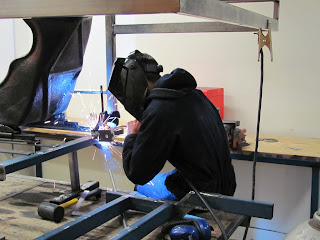ADULT LEARNING THEORIES AND APPROACHES.
Project based learning.
If we look at what the guys do in the Automech programme then it is mostly all PBL.
If you look at the demographic and social life's that these guys are part of plus their cultural,personal and often medical reasons they are here then it really does show why
we use PBL.
If we tried the old and tired sit down in a classroom when some of these guys only have a short attention span then we would be setting them up to fail.
They have already done 10 yrs of schooling where they spent a lot of time away from school or sat out side the principals office, they were either disruptive or just bored.
This shows that this kind of system does not work with these guys for one reason or another.
We have found that these guys( learn on their feet.)
What do i mean?
If you look these guys learn by doing, firstly we talk about health and safety around a certain piece of equipment then we show the guys how it works, then we let them use the equipment.
If for example we look at one of our projects (the grass karts) we then know that this type of learning works.We get them to design their karts and when it comes to the manufacturing we offer them different processes they could use, this gets them thinking about which one they would choose and which materials they are going to use.
If say they were fabricating using round mild steel tubular steel then we give them the options of either rolling the steel through rollers or bending them through a bender, they get to learn these processes by using them and working with them rather than from a text book.
This is one of our guys using the magnetic bender on flat mild steel bar. He learns that this kind of bender works only on mild steel because it is a ferrous metal (magnetic).
Another process they use on their karts is MIG welding (Metal inert Gas), we teach them how to use the welder and then why we use this process on their karts and when they have done this we apply some theory on why we use an inert gas instead of an active gas on this process.
This is how project based learning works and how the guys pick up the learning.
If you read some of Vgotsky's works he says of how young people learn better by firstly being shown and then mentoring them along either by the tutor or a buddy.
If you look up the link http://en.wikipedia.org/wiki/Lev_Vygotsky ,it says of the ZDP the Zone of Proximal Development and states that young people have different needs and different levels of help are needed to help them along,basically it means the tutor offers more support to the student who is having more difficulty.He also addresses that if some of the students cannot perform independently then they will need extra guidance albeit working alongside a more competent student (buddy) and this also helps them understand the tasks.
Ideally more than anything this promotes development and confidence.
The zone of proximal development has been defined as "

This definitely works in our programme where a lot of the guys were disengaged from the school system but still enjoy learning but in a different way, yes they tend to be wayward at times and are challenging to keep on task at times because they don't always think ahead mainly just here and now.
1902-1977
I was a Soviet psychologist.
I believed in the importance of discovering " the way natural processes such as physical maturation and sensory mechanisms become intertwined with culturally determined processes to produce the psychological functions of adults" (Luria, 1979, p. 43).
I believe that what we are doing with these guys really helps them learn a different way and a way that is relevant to their needs and behaviours.

Cheers,
the distance between the actual developmental level as determined by independent problem solving and the level of potential development as determined through problem solving under adult guidance, or in collaboration with more capable peers" (Vygotsky, 1978, p86).

This definitely works in our programme where a lot of the guys were disengaged from the school system but still enjoy learning but in a different way, yes they tend to be wayward at times and are challenging to keep on task at times because they don't always think ahead mainly just here and now.
1902-1977
I was a Soviet psychologist.
I believed in the importance of discovering " the way natural processes such as physical maturation and sensory mechanisms become intertwined with culturally determined processes to produce the psychological functions of adults" (Luria, 1979, p. 43).
I believe that what we are doing with these guys really helps them learn a different way and a way that is relevant to their needs and behaviours.

Cheers,


Great choice of learning theory Nick and wonderfully explained and illustrated. I just love the pics. The other thing that I like about the ideas associated with the ZPD is that the amount of scaffolding can be gradually weaned off as students' ability and knowledge grows. This theory recognises that everyone works at a different level so acknowledgement is given to the fact that 'no one size fits all'.
ReplyDeleteSomething I believe that teachers need to watch out for though is that they don't spend all their time with the people who are struggling - often it will not be the top ones that suffer but the middle level learners. If a core few are getting all the attention this can be offputting to the other students - so your suggestion of using buddies could be good for everyone high, middle or low level.
How much pair and group work do you get your students to do in this PBL model of learning? I always assume that because it is project-based that people will be working in small groups a lot. Is this so?